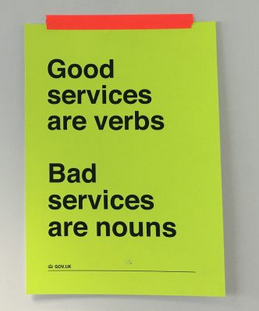The Government Digital Service has announced that certain abbreviations, namely etc., e.g. and i.e. are going to be “phased out” from UK government websites. You may think this sounds like a pointless endeavour, and you’d be right. So let’s look at their justifications.
1. “Several programs that read webpages for those with visual impairment read ‘eg’ incorrectly.”
So, instead of getting this bug fixed (which would seem like a very useful thing to get done, since e.g. is such a common lexeme and is not going to go away, whatever the policy of any one institution happens to be), the Government’s digibods have decided to embark on the minor task of changing the language.
(It’s worth mentioning here that although most people write e.g. with two periods, many style guides recommend the spelling “eg.” or “eg”, and these are the spellings that “several programs” have a problem with. But why do they have a problem? It really is a trivial problem to solve: just tell the software that “eg.” and “eg” are pronounced “e.g.”.)
2. “There are better, clearer ways of introducing examples for all users. We promote the use of plain English on GOV.UK. We advocate simple, clear language. Terms like eg, ie and etc, while common, make reading difficult for some.”
How to write better and clearer is a matter of opinion. But there are words, phrases and constructions that are wronger, rarer or more complicated than others, and of course it’s wise to avoid them if clarity is the number one goal of a text. So there is something to be said for avoiding i.e.: it’s not especially common, and there’s quite a lot of people who read it without understanding its significance (or even confuse it with e.g.).
But it’s hard to use the same argument for etc. or e.g. Both are very common and widely understood. They are English words in their own right since people know how to pronounce them and know what they mean without knowing (or worrying about) what their origin is or why they’re written like that. etc. is often pronounced “e t c” instead of “etcetera”, and is often written “ect.” but neither of these things affect general understanding.
It’d be interesting to know what evidence the author has that understanding etc. and e.g. (except in relation to the software issue mentioned above) is more difficult than any other word that has a similar frequency of use.
3. “Anyone who didn’t grow up speaking English may not be familiar with them.”
This is the most desperate strand of the digibods’ argument. Surely this claim could be made about any lexeme of the English language? If you didn’t grow up speaking English you might not be familiar with “green”, “happy”, “government”, “etc.”, “no.”, “Mrs” and “antidisestablishmentarianism”, etc, etc. Virtually all English courses teach etc. and e.g. so this claim is simply truistic bullshit.
4. “When we’re updating existing pages, we’ll replace the eg, etc and ie.”
I wonder how many people think this is a good use for our taxes (and people’s time)?
***
Style guides exist. The people who produce them justify their existence in a variety of ways. But their existence doesn’t mean that interference in the natural forces of language use is a thing that should be encouraged, at least not except in certain specific circumstances.
There are many problems with the English language, but 99% of the time we navigate them successfully. Some of the most common errors include the confusion of they’re, there and their, you’re and your, too and to, off and of, it’s and its. Shouldn’t we do something about this? Maybe simplify the spellings, with one spelling for each: there, your, to, of and its? Well, no, we probably shouldn’t. Interfering with the language is hubristic, Canutian and patronising, and causes confusion, arguments and resentment. Let the language evolve naturally and if there’s a real problem, i.e. one that impedes communication, people will vote with their feet.
etc., e.g., and i.e. are common features of the English language. Even if there was a genuine reason to eschew them, it’d be quite a challenge to do so consistently, and making them rarer will only make them more difficult to understand. The only reason to substitute another word for any of them is if there is genuine feedback that individual or general usage is confusing people.

